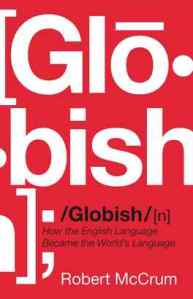How the English Language
Became the World’s Language
By Robert McCrum
Reviewed by Howard Shapiro Posted Aug. 29, 2010 to Philly.com
To anyone who travels beyond the United States, it’s not news that, for better or worse, English has become the world’s language.No longer will people abroad automatically let you try out your French or Spanish or Japanese at the start of an everyday transaction in a restaurant, or shop, where your American-tinged tongue is more likely to draw an immediate English response, no questions asked. Sure, there remain places where this rarely happens. They are not the world’s cities. And they are likely to be remote.
Well, good for us, you might say, we can be understood, a primary benefit of being human.
Well, bad for the world, you might say; it is becoming less diverse as English becomes the universal lingua franca.
Language not only defines a national culture, it also gives its speakers the tools to turn thoughts into something concrete – and among the beauties of different languages is that they offer different ways of doing so.
Robert McCrum, associate editor of Britain’s Observer, is not out to wow us with old news about the ever-progressing global advance of English. Instead, his book is a thoroughly researched, cleverly told big-picture tale of how our language got to be that way – and just what that way means: ungovernable, he says, taken for granted, ever-changing.
McCrum is clearly prepared to tell this tale, which he does as if the spread of a language is good drama, with subplots and twists. He was a cowriter of the BBC/PBS television series The Story of English in the ’80s, and he has taken that story, laced it with examples from the ages right down to now, and come up with a book that not only repackages his earlier work but also grounds it in a whole new context.
Globish, he writes, is the “biography of a phenomenon.”
McCrum’s first image, in the prologue, comes from the People’s University in Beijing, where several hundred students are part of an “English corner,” he writes, “here to join the English-speaking world.” They will “submit to whatever extraordinary adjustment it takes. After all, Mandarin (more than 1,000 million speakers) outnumbers the global figure for English by more than two to one.”
Yet it is English that rules as the world tongue – and even the Chinese are now finding new ways to teach it; McCrum cites a way of learning called Crazy English, in which people learn to speak first, write later. “To shout loud, you learn” is the slogan, he tells us.
I was hooked from the very beginning of McCrum’s history of how English became Globish – a 1995 coinage he attributes to a French-speaking former IBM executive and amateur linguist named Jean-Paul Nerrière.
McCrum starts by examining the Roman historian Tacitus’ account of the sacrificial ritual of the Anglii, and takes us through invasion after invasion, and through cultural changes that brought English to commoners, for whom forbidding church Latin was steeped in mystery. Royalty picked up English, too, gaining even more power by speaking what the lowest-lives spoke on the street.
The Bible in English became a milestone for the language; so did the switch to English as the language of the courts in London in the mid-1300s. Romans, Normans, Saxons – they all had a hand in forming the language. And the language itself, a never-satisfied thief that stole anything it liked (and still does), continued to thrive through religious zealots and poets. Its power went hand-in-hand with British imperialism. As the empire expanded, so did English.
Early on in Globish, McCrum makes the case that trade, culture, and especially the sea helped to define the English people and spread their language. “The sea,” he writes, “linked Liverpool to Dublin and Charleston, Whitby to London and New South Wales, and Bristol to Jamaica, Philadelphia and Calcutta. In the making of an English consciousness, it is impossible to overestimate the importance of the sea.”
When the English colonize America, it’s immediately clear that the language will grow in ways no Brit might have imagined – and quickly. “For Adams, Jefferson, Franklin and the other leaders of the American Revolution, American English was the proud badge of independence, a language with a future,” McCrum tells us. By 1828, Webster had codified American English in his landmark dictionary. Thirty-five years later, President Abraham Lincoln would offer his Gettysburg Address, “the work of a man steeped in the rhythms of the Bible and well-versed in the mysteries of Shakespeare . . . one of the high-points in the making of the English-speaking world.”
And so it goes – a black English evolving from slavery, a mass exodus of Britons moving overseas to Canada, or Australia, or India, around the world a 19th century of British English universally heard. It becomes clear that the history of the West, and later some of the East, and the impact of English are bedfellows.
McCrum’s march through history ends with myriad examples of the way English is the common carrier of new ideas and social discourse at many levels in a (largely English-oriented) computerized universe.
“In a Globish world,” he maintains, “everyone has access to an unlimited supply of data which floats, detached from all cultural anchors, in the infinite reservoir of cyberspace. . . . Globish will be used to argue for a ‘free commons’ of the mind.”
In McCrum’s account – which ends on the streets of Baghdad – English has been instrumental in making that argument, in some form or another, through history.
Read more: http://www.philly.com/philly/entertainment/20100829_The_ascent_of_English_as_king_of_languages.html#ixzz17IKCeOwZ


